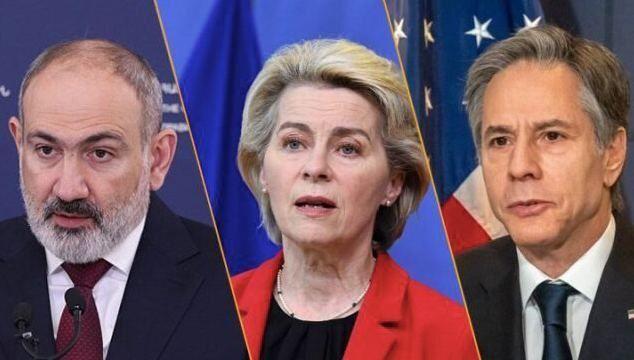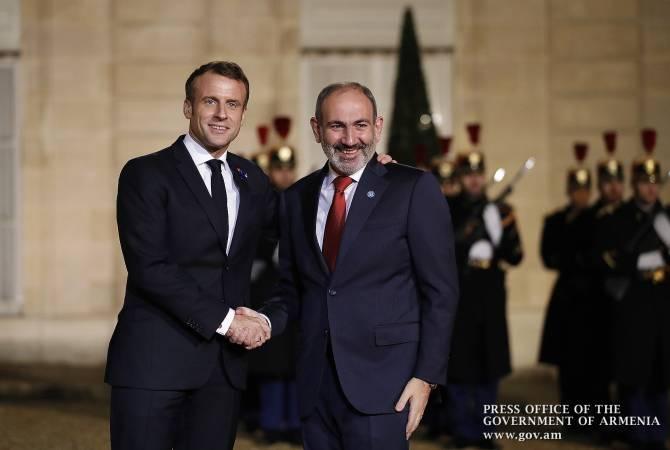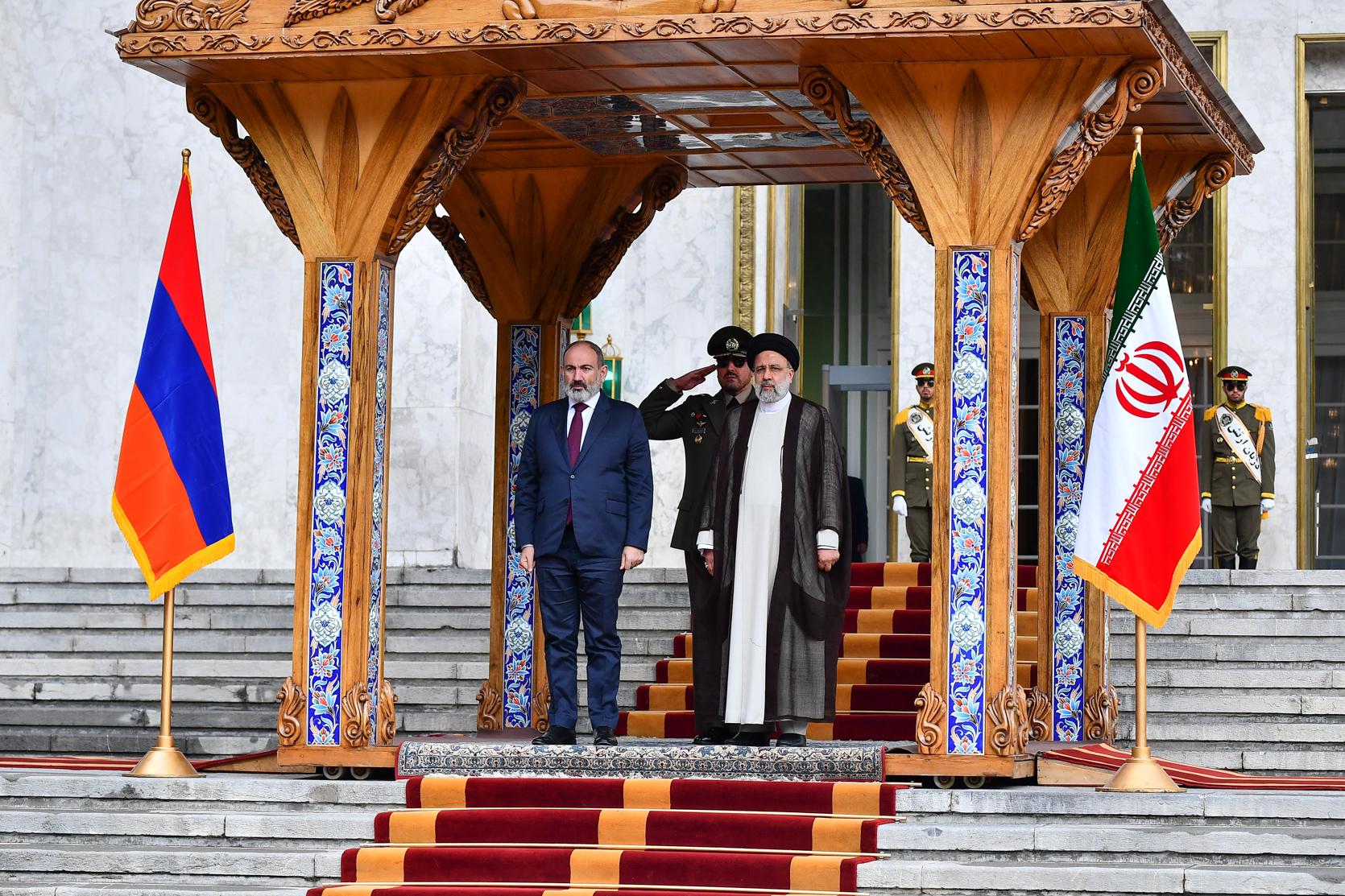Addressing Azerbaijan's concerns amid rising tensions ahead of Brussels meeting
US diplomatic efforts in South Caucasus
ANALYTICS 04 April 2024 - 19:00
| Fuad Muxtar-Agbabali |
In a diplomatic outreach on April 3, US Secretary of State Antony Blinken reached out to President Ilham Aliyev, emphasizing the importance of addressing Azerbaijan's apprehensions over the upcoming April 5 Brussels tripartite meeting involving the USA, the EU, and Armenia.
"The secretary reinforced the importance of the US-Azerbaijani bilateral relationship and highlighted a growing number of partnership initiatives, including energy and climate priorities. Secretary Blinken and President Aliyev discussed the importance of advancing the peace process between Azerbaijan and Armenia, which would bring economic benefits to the entire region. The secretary underscored that there is no justification for increased tension on the border and cautioned that aggressive actions and rhetoric from any side would undermine prospects for peace," State Department Spokesperson Matthew Miller said in a press release.
The official statement from the Azerbaijani presidential press service said that Blinken acknowledged reports about the forthcoming trilateral meeting sparked Azerbaijan’s concerns, emphasizing the imperative of addressing these concerns by engaging directly with President Aliyev to provide clarity on the matter. Secretary Blinken underscored that the primary agenda of the meeting would revolve around the economic development issues concerning Armenia.

In response, President Ilham Aliyev relayed insights garnered from the preparation discussions leading up to the trilateral meeting, highlighting topics such as military assistance to Armenia, joint military exercises, the establishment of military infrastructure along border areas with Azerbaijan, and Armenia's acquisition of armaments through the EU's European Peace Facility, funded by the US budget. He emphasized that such initiatives, with an inherently anti-Azerbaijani stance, including France's policy of arming Armenia, could exacerbate the arms race in the region and potentially lead to provocations.
Throughout the telephone exchange, the report adds, Blinken reiterated that the meeting was not directed against Azerbaijan. Discussions also delved into the ongoing peace negotiations between Armenia and Azerbaijan and Ilham Aliyev expressed optimism about the recent negotiations in Berlin facilitated by the foreign ministers, citing their potential to advance the peace process and stressing the importance of expediting the negotiations.
Furthermore, President Aliyev vehemently refuted accusations from Western quarters suggesting Azerbaijan's intentions to attack Armenia, labeling them as utterly baseless, highlighting instances of misinformation, particularly citing the French foreign minister’s April 2 remarks, where Azerbaijan was accused of disregarding Armenia's territorial integrity and posing a threat.
President Ilham Aliyev also warned that the non-transparent preparation, lack of inclusivity, and refusal to postpone the trilateral meeting despite Azerbaijan's legitimate concerns could potentially escalate tensions and foster new divisions rather than fostering peace and cooperation in the South Caucasus.
Can the West replace Russia in Armenia?
Blinken's assertion that the primary focus of the upcoming meeting will be on the economic advancement of Armenia lacks credibility as both Washington and Brussels cannot provide the necessary financial assistance, which remains heavily reliant on Russia economically.

Experts argue that even if the West were to allocate billions of dollars to Armenia, it would not address the country's economic challenges. If Russia were to cut off gas supplies to Armenia, neither the US nor the EU could resolve the issue. Washington and Brussels understand that the key to reducing Armenia's economic dependence on Russia lies in normalizing relations with Azerbaijan and Turkey.
Experts believe that central to the agenda of the Brussels meeting is the display of solidarity towards Armenia, meticulously crafted to counterbalance Azerbaijan's assertiveness in pursuing a peace treaty on its terms. This strategic move underscores the geopolitical interests at play, with Brussels aiming to bolster Armenia's position vis-à-vis Azerbaijan.
Beyond mere diplomatic gestures, the West's agenda extends to nurturing a favorable environment for Nikol Pashinyan. By extending overt and covert support, the West aims to consolidate Pashinyan's leadership, thereby advancing its strategic interests in the region. The purported focus on providing economic aid and promoting democratic reforms serves as a smokescreen for deeper geopolitical maneuvers.
For the past three years, the West has meticulously cultivated ties with Armenia, strategically maneuvering to weaken Russia's influence in the region. Exploratory dialogues have sought to delineate the limits of Moscow's resistance while emboldening Pashinyan to pivot away from Russia's orbit. Recent overtures by Armenia, particularly regarding its stance on the CSTO and other Kremlin-dominated entities, signal a decisive shift towards asserting independence from Russian hegemony.
Armenia's calculated steps towards distancing itself from Russian influence have prompted speculation about potential security ramifications. As Armenia contemplates its departure from the CSTO and the Eurasian Economic Union, questions loom over the feasibility of ensuring security guarantees and mitigating economic repercussions.
Amid escalating tensions along the conventional border with Azerbaijan, Armenia finds itself at a crossroads, exploring alternative avenues for security cooperation, including the prospect of French and US intervention in the event of military provocations. In essence, the Brussels meeting epitomizes a strategic gambit aimed at reshaping the geopolitical dynamics of the South Caucasus.
Nikol Pashinyan's bold assertion that failure to return four non-enclave villages would prompt Azerbaijani aggression underscores the escalating tensions and strategic brinkmanship at play.
This calculated move by Pashinyan not only serves to test the resolve of Azerbaijan but also underscores Armenia's strategic calculus in leveraging international support. By keeping the situation on a knife's edge, Armenia aims to draw attention to its grievances while signaling its readiness to defend its interests by any means necessary.
France and its allies, cognizant of the strategic importance of the South Caucasus, are actively working to tip the scales in Armenia's favor. Central to this agenda is the objective of weakening Azerbaijan's position in peace negotiations and thwarting its ambitions regarding the Zangazur Corridor. Control over communication and transport lines, particularly the Middle Corridor, represents a strategic imperative for France and its allies, positioning Armenia as a crucial pawn in their geopolitical calculus.

The forthcoming meeting in Brussels also serves as a pivotal moment in this geopolitical chess game, where veiled objectives intertwine with diplomatic niceties. Beyond the façade of economic support and democratic reforms lies a deeper agenda aimed at reshaping the regional power dynamics. Opening a front against Russia in the South Caucasus represents a calculated move by France and its allies, seeking to assert their influence in a region long considered within Moscow's sphere of influence.
Armenia's willingness to serve as an outpost for Western interests in the South Caucasus adds another layer of complexity to the geopolitical landscape. As tensions simmer and rivalries intensify, Armenia finds itself caught between competing geopolitical agendas, balancing the imperatives of national security with the demands of strategic alliances. The Brussels meeting is poised to be a crucible wherein the contours of future power dynamics in the South Caucasus are forged, with far-reaching implications for regional stability and global geopolitics.
Iran remains tight-lipped
Tehran’s conspicuous silence amidst the West's assertive maneuvers in its northern border contrasts sharply with its previous firm stance against third-party intervention. This enigmatic behavior prompts speculation about Iran's motives and strategic calculations.
One possible explanation lies in Iran's covert dealings with France, suggesting a willingness to exploit the West's actions in Armenia as leverage in bilateral negotiations. Such clandestine diplomacy often involves intricate bargaining to safeguard Iran's strategic interests.
Moreover, despite Tehran's unfriendly posture towards Azerbaijan, there are shared strategic objectives, particularly regarding regional stability. The alignment of Western plans with Iran's interests complicates the situation further. Azerbaijan remains resolute in defending its national interests.

While the West seeks to influence Armenia's allegiances, it must not disregard Azerbaijan's interests. Any attempt to coerce Azerbaijan risks destabilizing regional cooperation. The Turkish-Azerbaijani alliance stands ready to defend its interests through all available means.
US Secretary of State Blinken's recent call to President Aliyev aimed to allay concerns, but Azerbaijan's "red lines" are clear. The West must tread cautiously, mindful of the broader implications on regional stability.
Caliber.Az
|
1
|
700 tunnel shafts found in Rafah, 50 cross into Egypt Israel informs South Africa at UN top court
17 May 2024 - 15:56
|
|
2
|
Uncertainty over Russian border guard withdrawal from Armenia Amid conflicting statements
18 May 2024 - 14:47
|
|
3
|
New Caledonia crisis mirrors Macron's hypocrisy on Azerbaijan France faces its own crisis
17 May 2024 - 17:20
|
|
4
|
Giant meteor seen lighting up skies of Portugal
19 May 2024 - 13:11
|
|
5
|
Azerbaijan sets priorities ahead of COP29 "Green" financing, ESG implementation
18 May 2024 - 12:13
|
What von der Leyen’s campaign tour says about her priorities
Review by Euractiv20 May 2024 - 03:59
Political violence is on the rise in EU, driven by extremism and disillusionment
Analysts talk to Euronews20 May 2024 - 02:01
How are museums still justifying keeping stolen artifacts?
Bloomberg reveals20 May 2024 - 00:03
Techcraft on display in Ukraine
Analysis by War on the Rocks19 May 2024 - 22:00
Chinese state-backed company to launch space tourism flights by 2028
19 May 2024 - 20:01
Ukraine destroys another Russian ship
19 May 2024 - 18:01
Slovak PM Fico no longer in immediate danger but condition serious, deputy says
19 May 2024 - 17:40
Iranian president's helicopter makes hard landing on border with Azerbaijan
19 May 2024 - 17:25
Russia's forces shot down 9 ATACMS missiles, 61 drones overnight
19 May 2024 - 17:17
France mobilises police to regain control of New Caledonia airport road
19 May 2024 - 16:49
India doubles purchase of Russian diamonds
19 May 2024 - 16:26
Venezuela approves investment agreement with Türkiye
19 May 2024 - 15:58
Coup d'état thwarted in Democratic Republic of Congo
19 May 2024 - 15:30
Biden, Trump accuse each other of threatening democracy
19 May 2024 - 15:09
"Iran, Azerbaijan show a very strong joint political will today"
President Aliyev tells Raisi during meeting at the border/PHOTO19 May 2024 - 14:40
Russian oil refinery suspends operations after drone falls on its site
19 May 2024 - 14:14
Iranian ambassador: New page opened in relations with Azerbaijan
19 May 2024 - 13:52
Erdogan commemorates 105th anniversary of Turkish freedom struggle
Ataturk Memorial Day19 May 2024 - 13:29
Giant meteor seen lighting up skies of Portugal
19 May 2024 - 13:11
Azerbaijan, Russia discuss enhanced economic, transport cooperation at KazanForum 2024
PHOTO19 May 2024 - 12:51
Latvian Parliament speaker arrives in Azerbaijan's Fuzuli
PHOTO19 May 2024 - 12:35
Construction of Turkish Akkuyu Nuclear Power Plant nears completion, director says
19 May 2024 - 12:21
Israel, Hamas suspend prisoner swap talks
19 May 2024 - 11:52
German chancellor warns against full-scale ground operation in Rafah
19 May 2024 - 11:23
China uncovers "multiple espionage cases" in space sector
19 May 2024 - 10:54
Latvian Parliament speaker pays official visit to Azerbaijan
19 May 2024 - 10:25
President Aliyev inaugurates “Zangilan” and “Shayifli” hydroelectric power plants
PHOTO19 May 2024 - 09:56
President’s aide discusses Azerbaijani-American partnership at US Institute of Peace
PHOTO19 May 2024 - 09:27
Germany's Bundesrat passes gender self-identification law
19 May 2024 - 09:00
Poland to spend over 2.3 bln euros to fortify eastern border
PM says19 May 2024 - 06:30
Kim's sister denies North Korea has supplied weapons to Russia
19 May 2024 - 04:23
Iran hangs two women as surge in executions intensifies: NGO
19 May 2024 - 02:20
US Army’s multidomain task force contributing to AUKUS
19 May 2024 - 00:15
Slovakia at pivotal moment after Robert Fico shooting
18 May 2024 - 22:10
Russia admits it can’t halt nighttime uncrewed surface vessel raids
18 May 2024 - 20:00
Palestinian resistance eliminates 15 Israeli soldiers in Rafah
18 May 2024 - 18:18
Slovak PM’s attacker pleads guilty before court — media
18 May 2024 - 18:08
White House not thrilled by Macron’s D-Day invite to Russia
18 May 2024 - 17:59
Poland to begin construction of Eastern Shield
18 May 2024 - 17:47
Resistance destroys 100 Israeli vehicles in 10 days
18 May 2024 - 17:32
